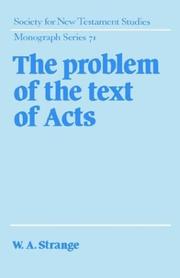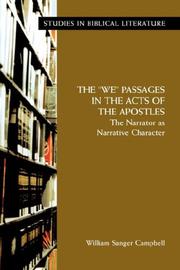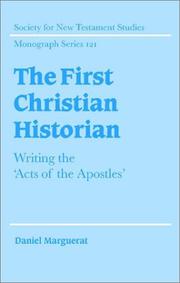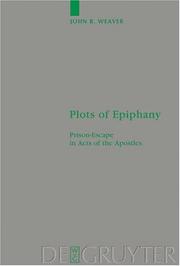| Listing 1 - 10 of 28 | << page >> |
Sort by
|

ISBN: 0521413842 0521018803 0511555105 0511880065 9780521413848 9780511555107 9780521018807 Year: 1991 Volume: 71 Publisher: Cambridge Cambridge University Press
Abstract | Keywords | Export | Availability | Bookmark
 Loading...
Loading...Choose an application
- Reference Manager
- EndNote
- RefWorks (Direct export to RefWorks)
In the book of Acts, the so-called Western text departs from the alternative text in numerous points of detail. These divergences in the textual tradition of Acts have been the subject of renewed interest in recent years, with a notable concentration on Lucan traits in the Western text. The author of this study takes into account recent theories which have been proposed on the textual tradition of Acts, and puts forward an ingenious thesis (not considered hitherto) to explain the existence of two streams of textual tradition for the book. Analysis of a number of Western textual variants in Acts suggests that they may have arisen from the incorporation of marginal annotations into the text of Acts, but Lucan thought and language is indeed characteristic of these readings. Investigation of the non-Western textual tradition uncovers occasional signs of editing according to the interests of the second-century church. From this evidence Dr Strange proposes that Acts shared the fate of numerous other works of antiquity by being published posthumously; the work of two second-century editors is responsible for the remarkable divergence in the textual tradition of Acts.
Bible --- Criticism, Textual --- 226.6 --- #GROL:SEMI-226.6 --- Handelingen der apostelen. Akten van de apostelen --- Bible. --- Acts (Book of the New Testament) --- Acts of the Apostles --- Chongdo haengjŏn --- Sado haengjŏn --- Criticism, Textual. --- Arts and Humanities --- Religion

ISBN: 9781589832053 1589832051 9781435626973 1435626974 Year: 2007 Publisher: Atlanta Society of Biblical Literature
Abstract | Keywords | Export | Availability | Bookmark
 Loading...
Loading...Choose an application
- Reference Manager
- EndNote
- RefWorks (Direct export to RefWorks)
226.6 --- 226.6 Actes des apotres --- 226.6 Handelingen der apostelen. Akten van de apostelen --- Actes des apotres --- Handelingen der apostelen. Akten van de apostelen --- Bible. --- Acts (Book of the New Testament) --- Acts of the Apostles --- Chongdo haengjŏn --- Sado haengjŏn --- Criticism, Narrative.
Book
ISBN: 9783110344028 9783110347265 3110344025 Year: 2014 Volume: 203 Publisher: Berlin Boston
Abstract | Keywords | Export | Availability | Bookmark
 Loading...
Loading...Choose an application
- Reference Manager
- EndNote
- RefWorks (Direct export to RefWorks)
Bible. --- Criticism, interpretation, etc --- Rome --- Army --- Officers --- History --- 226.6 --- Handelingen der apostelen. Akten van de apostelen --- Rome - Army - Officers --- Rome - History - Empire, 30 BC-284 AD
Book
ISBN: 9783110459708 3110459701 9783110460377 9783110460193 3110460378 311046019X Year: 2016 Volume: 221 Publisher: Berlin Boston
Abstract | Keywords | Export | Availability | Bookmark
 Loading...
Loading...Choose an application
- Reference Manager
- EndNote
- RefWorks (Direct export to RefWorks)
While there have been various studies examining the contents of the evangelistic proclamation in Acts; and various studies examining, from one angle or another, individual persuasive phenomena described in Acts (e.g., the use of the Jewish Scriptures); no individual studies have sought to identify the key persuasive phenomena presented by Luke in this book, or to analyse their impact upon the book’s early audiences. This study identifies four key phenomena – the Jewish Scriptures, witnessed supernatural events, the Christian community and Greco-Roman cultural interaction. By employing a textual analysis of Acts that takes into account both narrative and socio-historical contexts, the impact of these phenomena upon the early audiences of Acts – that is, those people who heard or read the narrative in the first decades after its completion – is determined. The investigation offers some unique and nuanced insights into evangelistic proclamation in Acts; persuasion in Acts, persuasion in the ancient world; each of the persuasive phenomena discussed; evangelistic mission in the early Christian church; and the growth of the early Christian church.
Apologetics --- 226.6 --- 226.6 Actes des apotres --- 226.6 Handelingen der apostelen. Akten van de apostelen --- Actes des apotres --- Handelingen der apostelen. Akten van de apostelen --- History --- Bible. --- Acts (Book of the New Testament) --- Acts of the Apostles --- Chongdo haengjŏn --- Sado haengjŏn --- Criticism, interpretation, etc. --- Christianity and other religions --- Evangelistic work --- Persuasion (Rhetoric) --- Proselytizing --- Acts. --- Apostelgeschichte. --- Argumentation. --- Evangelism. --- Missionierung. --- Persuasion. --- RELIGION / Biblical Criticism & Interpretation / New Testament. --- Greek. --- Biblical teaching. --- To 1500. --- Judaism. --- New Testament. --- עידוד להמרת דת --- Proselytes and proselyting, Jewish --- Jewish converts --- שכנוע (רטוריקה) --- פעילות אוואנגלית --- נצרות ודתות אחרות --- יהדות --- היסטוריה --- השקפת התנ"ך --- יוונית --- הברית החדשה.

ISBN: 0521816505 0521609496 1107134471 0511178158 0511042639 0511148658 0511325924 0511488068 1280434252 0511045867 9780521816502 9780511042638 9780511148651 9780511045868 9780511488061 9781107134478 9781280434259 9780511178153 9780511325922 9780521609494 Year: 2002 Volume: 121 Publisher: Cambridge Cambridge University Press
Abstract | Keywords | Export | Availability | Bookmark
 Loading...
Loading...Choose an application
- Reference Manager
- EndNote
- RefWorks (Direct export to RefWorks)
As the first historian of Christianity, Luke's reliability is vigorously disputed among scholars. The author of the Acts is often accused of being a biased, imprecise, and anti-Jewish historian who created a distorted portrait of Paul. Daniel Marguerat tries to avoid being caught in this true/false quagmire when examining Luke's interpretation of history. Instead he combines different tools - reflection upon historiography, the rules of ancient historians and narrative criticism - to analyse the Acts and gauge the historiographical aims of their author. Marguerat examines the construction of the narrative, the framing of the plot and the characterization, and places his evaluation firmly in the framework of ancient historiography, where history reflects tradition and not documentation. This is a fresh and original approach to the classic themes of Lucan theology: Christianity between Jerusalem and Rome, the image of God, the work of the Spirit, the unity of Luke and the Acts.
Bible --- Historiography --- 226.6 --- Handelingen der apostelen. Akten van de apostelen --- Bible. --- Acts (Book of the New Testament) --- Acts of the Apostles --- Chongdo haengjŏn --- Sado haengjŏn --- Historiography. --- Bible. N.T. Acts --- Arts and Humanities --- Religion
Book
ISBN: 9781107187856 1107187850 9781316946251 9781316638361 1316638367 1316992837 1316992519 1316993477 1316993159 1316994430 1316946258 1316990591 Year: 2017 Publisher: Cambridge Cambridge University Press
Abstract | Keywords | Export | Availability | Bookmark
 Loading...
Loading...Choose an application
- Reference Manager
- EndNote
- RefWorks (Direct export to RefWorks)
Acts of the Apostles is normally understood as a historical report of events of the early church and serves as the organizing centerpiece of the New Testament canon. In this book, Drew W. Billings demonstrates that Acts was written in conformity with broader representational trends and standards found on imperial monuments and in the epigraphic record of the early second century. Bringing an interdisciplinary approach to a text of critical importance, he compares the methods of representation in Acts with visual and verbal representations that were common during the reign of the Roman emperor Trajan (98-117 CE). Billings argues that Acts adopts the rhetoric of Roman imperialism as articulated in the images and texts from the period. His study bridges the fields of classics, art history, gender studies, Jewish studies, and New Testament studies in exploring how early Christian texts relate to wider patterns in the cultural production of the Roman Empire.
Church history --- Imperialism. --- Colonialism --- Empires --- Expansion (United States politics) --- Neocolonialism --- Political science --- Anti-imperialist movements --- Caesarism --- Chauvinism and jingoism --- Militarism --- Apostolic Church --- Christianity --- Church, Apostolic --- Early Christianity --- Early church --- Primitive and early church --- Primitive Christianity --- Fathers of the church --- Great Apostasy (Mormon doctrine) --- Bible. --- Acts (Book of the New Testament) --- Acts of the Apostles --- Chongdo haengjŏn --- Sado haengjŏn --- Criticism, interpretation, etc. --- History of Biblical events. --- History of contemporary events. --- Rome --- Politics and government --- History --- Politics and government. --- Primitive and early church. --- 30 B.C.-600 A.D. --- Rome (Empire). --- Imperialism --- 226.6 --- 226.6 Actes des apotres --- 226.6 Handelingen der apostelen. Akten van de apostelen --- Actes des apotres --- Handelingen der apostelen. Akten van de apostelen
Book
ISBN: 9783110255393 3110255391 9783110255409 9783110391961 3110391961 3110255405 9783112189498 3112189493 Year: 2016 Volume: 182 Publisher: Berlin Boston
Abstract | Keywords | Export | Availability | Bookmark
 Loading...
Loading...Choose an application
- Reference Manager
- EndNote
- RefWorks (Direct export to RefWorks)
David Moessner proposes a new understanding of the relation of Luke’s second volume to his Gospel to open up a whole new reading of Luke’s foundational contribution to the New Testament. For postmodern readers who find Acts a ‘generic outlier,’ dangling tenuously somewhere between the ‘mainland’ of the evangelists and the ‘Peloponnese’ of Paul—diffused and confused and shunted to the backwaters of the New Testament by these signature corpora—Moessner plunges his readers into the hermeneutical atmosphere of Greek narrative poetics and elaboration of multi-volume works to inhale the rhetorical swells that animate Luke’s first readers in their engagement of his narrative. In this collection of twelve of his essays, re-contextualized and re-organized into five major topical movements, Moessner showcases multiple Hellenistic texts and rhetorical tropes to spotlight the various signals Luke provides his readers of the multiple ways his Acts will follow "all that Jesus began to do and to teach" (Acts 1:1) and, consequently, bring coherence to this dominant block of the New Testament that has long been split apart. By collapsing the world of Jesus into the words and deeds of his followers, Luke re-configures the significance of Israel’s "Christ" and the "Reign" of Israel’s God for all peoples and places to create a new account of ‘Gospel Acts,’ discrete and distinctively different than the "narrative" of the "many" (Luke 1:1). Luke the Historian of Israel’s Legacy combines what no analysis of the Lukan writings has previously accomplished, integrating seamlessly two ‘generically-estranged’ volumes into one new whole from the intent of the one composer. For Luke is the Hellenistic historian and simultaneously ‘biblical’ theologian who arranges the one "plan of God" read from the script of the Jewish scriptures—parts and whole, severally and together—as the saving ‘script’ for the whole world through Israel’s suffering and raised up "Christ," Jesus of Nazareth. In the introductions to each major theme of the essays, this noted scholar of the Lukan writings offers an epitome of the main features of Luke’s theological ‘thought,’ and, in a final Conclusions chapter, weaves together a comprehensive synthesis of this new reading of the whole.
226.6 --- 226.6 Actes des apotres --- 226.6 Handelingen der apostelen. Akten van de apostelen --- Actes des apotres --- Handelingen der apostelen. Akten van de apostelen --- Bible. --- Acts (Book of the New Testament) --- Acts of the Apostles --- Chongdo haengjŏn --- Sado haengjŏn --- Luc (Book of the New Testament) --- Lucas (Book of the New Testament) --- Luka (Book of the New Testament) --- Lukan săn zăn︠g︡g (Book of the New Testament) --- Lukas (Book of the New Testament) --- Luke (Book of the New Testament) --- Lūqā (Book of the New Testament) --- Nuga pogŭm (Book of the New Testament) --- Ruka den --- Ruka ni yoru fukuinsho --- Criticism, interpretation, etc. --- Acts. --- Apostelgeschichte. --- Biblical Theology. --- Biblische Theologie. --- Gospel of Luke. --- Historiographie. --- Historiography. --- Lukasevangelium. --- Schriften Israels. --- Scriptures of Israel. --- RELIGION / Biblical Criticism & Interpretation / New Testament. --- New Testament. --- הברית החדשה. --- ביקורת, פרשנות וכד'
Book
ISBN: 9783110614756 9783110614558 3110614553 9783110615197 3110615193 3110614758 Year: 2019 Volume: 238 Publisher: Berlin Boston
Abstract | Keywords | Export | Availability | Bookmark
 Loading...
Loading...Choose an application
- Reference Manager
- EndNote
- RefWorks (Direct export to RefWorks)
"Two types of exegetical habits shape interpretations of Lukan eschatology: enduring assumptions when approaching the text that, in contrast to his synoptic siblings, Luke has removed eschatological interest in response to the delayed parousia; and recent tendencies to focus on genre and thus to compare Luke/Acts to (predominantly) non-Jewish Graeco-Roman historiographies, where themes of an eschatalogical character do not feature. This study takes a fresh approach, demonstrating the need to consider Luke's text within its broader literary context, providing a rigorous methodology for cross-genre comparisons of themes which transcend generic boundaries, and ultimately reasserting the importance of Luke's understanding of the end of history as it reshapes experience in the present."-- "Luke/Acts and the End of History investigates how understandings of history in diverse texts of the Graeco-Roman period illuminate Lukan eschatology. In addition to Luke/Acts, it considers ten comparison texts as detailed case studies throughout the monograph: Polybius's Histories, Diodorus Siculus's Library of History, Virgil's Aeneid, Valerius Maximus's Memorable Doings and Sayings, Tacitus's Histories, 2 Maccabees, the Qumran War Scroll, Josephus's Jewish War, 4 Ezra, and 2 Baruch."--
Eschatology --- History --- 226.4 --- 226.6 --- 226.6 Actes des apotres --- 226.6 Handelingen der apostelen. Akten van de apostelen --- Actes des apotres --- Handelingen der apostelen. Akten van de apostelen --- 226.4 Evangelie volgens Lucas --- 226.4 Evangile de S. Luc --- Evangelie volgens Lucas --- Evangile de S. Luc --- Biblical teaching --- Bible. --- Acts (Book of the New Testament) --- Acts of the Apostles --- Chongdo haengjŏn --- Sado haengjŏn --- Luc (Book of the New Testament) --- Lucas (Book of the New Testament) --- Luka (Book of the New Testament) --- Lukan săn zăn︠g︡g (Book of the New Testament) --- Lukas (Book of the New Testament) --- Luke (Book of the New Testament) --- Lūqā (Book of the New Testament) --- Nuga pogŭm (Book of the New Testament) --- Ruka den --- Ruka ni yoru fukuinsho --- Criticism, interpretation, etc. --- Bible --- Biblical teaching. --- Luke-Acts. --- divine and human agency. --- eschatology. --- philosophy of history in ancient texts. --- Eschatology - Biblical teaching --- History - Biblical teaching
Book
ISBN: 9780521175326 0521175321 9780521899819 9780511488146 9780511438738 0511438737 0511488149 0521899818 1107202507 1281903973 9786611903978 0511438060 0511436610 0511435819 0511437390 Year: 2008 Volume: 144 Publisher: Cambridge, UK New York Cambridge University Press
Abstract | Keywords | Export | Availability | Bookmark
 Loading...
Loading...Choose an application
- Reference Manager
- EndNote
- RefWorks (Direct export to RefWorks)
How does Luke's portrait of the outsider help in exploring the theology and historiography of Acts? Previous studies of the author and his work have concentrated on the speeches given by insiders - members of the early Christian church - but until now the speeches of the outsiders have been marginalised by scholars in the field. Osvaldo Padilla takes an intriguing approach by concentrating on the direct speech of such figures, arguing that the portrayal of outsiders to a religious movement should not be neglected when considering the author's viewpoint. By exploring the place of outsiders in Old Testament and Second Temple literature, then offering comparisons with the depictions found in Acts, Padilla provides an insightful take on the subject that will prove invaluable to scholars and students of biblical and early Christian studies.
Outsiders in the Bible. --- Bible. --- Criticism, interpretation, etc. --- Outsiders in the Bible --- Acts (Book of the New Testament) --- Acts of the Apostles --- Chongdo haengjŏn --- Sado haengjŏn --- Criticism, interpretation, etc --- 226.6 --- Handelingen der apostelen. Akten van de apostelen --- זרים במקרא --- New Testament. --- הברית החדשה. --- ביקורת, פרשנות וכד' --- Arts and Humanities --- Religion

ISBN: 3110182661 3110915618 9783110915617 9783110182668 Year: 2013 Volume: 131 Publisher: Berlin Boston
Abstract | Keywords | Export | Availability | Bookmark
 Loading...
Loading...Choose an application
- Reference Manager
- EndNote
- RefWorks (Direct export to RefWorks)
Der Autor vergleicht die drei Erzählungen der Apostelgeschichte über Gefängnisausbrüche mit anderen Befreiungswundern in griechisch-römischen und jüdischen Mythen. Eine Analyse dieser Geschichten und ihrer konventionellen Darstellung göttlicher Epiphanie und Kultbegründung ermöglicht neue Einblicke in den kulturellen Kontext und die narrative Darstellung frühchristlicher Geschichte in der Apostelgeschichte. Past scholarship on the prison-escapes in the Acts of the Apostles has tended to focus on lexical similarities to Euripides' Bacchae, going so far as to argue for direct literary dependence. Moving beyond such explanations, the present study argues that miraculous prison-escape was a central event in a traditional and culturally significant story about the introduction and foundation of cults - a story discernable in the Bacchae and other ancient texts. When the mythic quality and cultural diffusion of the prison-escape narratives are taken into account, the resemblance of Lukan and Dionysian narrative episodes is seen to depend less on specific literary borrowing, and more on shared familiarity with cultural discourses involving the legitimating portrayal of new cults in the ancient world.
Bible / N.T / Acts --- Criticism, Form --- Miracles --- Comparative studies --- Escapes --- Mythology --- Myth in the Bible --- 226.6 --- Handelingen der apostelen. Akten van de apostelen --- Myth in the Bible. --- Demythologization --- Prison escapes --- Adventure and adventurers --- Fugitives from justice --- Prisoners --- Prisons --- God --- Marvelous, The --- Miracle workers --- Spiritual healing --- Supernatural --- Bible. --- Acts (Book of the New Testament) --- Acts of the Apostles --- Chongdo haengjŏn --- Sado haengjŏn --- Criticism, Form. --- Jail breaks --- Prison breaks
| Listing 1 - 10 of 28 | << page >> |
Sort by
|

 Search
Search Feedback
Feedback About UniCat
About UniCat  Help
Help News
News